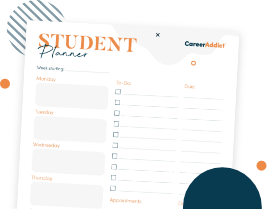
Are you thinking of dropping out of college? Take look at the below considerations, tips and options that are available to you.

Let’s make one thing clear: dropping out of college or university isn’t the end of the world!
If you’re considering leaving college and taking an alternative route, know that you are not alone. Indeed, with the rising costs of education, more and more students are choosing to drop out and pursue other endeavours without a college degree.
The truth is: dropping out of college can be one of the best things to happen to you. Just take Mark Zuckerberg, for example! However, not everyone has a thriving business to fall back on, which can make things a little trickier.
Dropping out should be a careful and contemplative decision. There is a lot at stake including your money, time, and future. But don’t worry because we’ve compiled a list of things you can do if you decide to quit school!

Here’s a list of good reasons why you might consider leaving college pre-emptively.
If you are experiencing persistent health issues that inhibit your ability to continue your college education, you may consider dropping out. Before you do so, however, consult your university and check whether they can provide reasonable accommodations that could enable you to continue your studies.
If you have financial support from your family, this can make college inaccessible from a monetary standpoint, especially if you want to avoid going into debt from student loans. That said, a lot of universities offer scholarships, bursaries and financial aid to struggling students. You may want to look into available options before dropping out for financial reasons.

If you are trying your best, devoting time in your degree, and getting for help from peers, tutors, and professors, but are still struggling to fit into academia, it may be time to consider taking an alternative course. That said, you may simply be in the wrong faculty and could succeed in a different field of study.
Significant life events such as the passing of a loved one could impact your mental health and your studies.
Other events, such as the birth of a child could also impact your performance; raising a family whilst pursuing higher education is a significant challenge.
However, your university could potentially offer helpful resources and services such as grief counselling and childcare, so make sure to research what is available to you.
Many college students change their majors a few times throughout the course of their studies. If you are one of those students, and are still unsure of what you want to study, it might be best to take time off to decide which course is suitable for you. You can always return when you have a better idea of what you’d like to pursue in your studies and beyond.
Need help picking a degree? Our career test can help you make the right choice.

Before making any big decisions, it’s best to do a self-inquiry. Ask yourself why you’re considering dropping out and think about the pros and cons of each viable option.
To helps you, we’ve compiled the following list of questions:
Dig deep when answering this one. Are you experiencing feelings of inadequacy? Are you having trouble balancing schoolwork and your social life? Are there actions you can take to mitigate these feelings without dropping out?
 Your First Week of College" />
Your First Week of College" />
Most universities provide students with academic advisors as well as campus counsellors to offer support both their academic performance and mental health. Before reaching your decision, it’s wise to talk it through with professionals who can provide offer you their help and advice if you are struggling.
There are many financial resources available to college students. While some of these resources include loans with interest rates, there are also scholarships and bursaries, which won’t put you into debt.
Grab your FREE student planner Instant Download Fillable PDF Made by Pros
Alternatively, you could look for part-time work opportunities within your campus, locally or online and put your paycheques towards your college tuition.
It just might be that you are not at the right university to meet your needs and interests. Consider transferring to a school that better suits you. If finances are still a major concern for you, look into community colleges which are much more affordable.
We wouldn’t recommend dropping out without some sort of a plan. Maybe you decide to take a gap year to travel and find yourself. Maybe you decide to start a business or find a part time job. Whatever it is, it’s best to have a vision and a plan.

If you’ve asked yourself the previous questions and you’ve determined that dropping out of college is still the best option for you, consider the following tips:
Share your plans with your friends and families. You might receive some pushback, but you might also get valuable advice from your loved ones. If you are still committed to your decision after hearing them out, then you’ve likely made the right choice.
Look into your university’s deadlines for withdrawals. Dropping out at the end of the semester or academic year might be the easiest option, but if you’d like to drop out prior to those dates, then consult your academic advisor to determine when it’s best to drop out of your course.
You need to notify your academic advisor of your intentions to drop out, even if you don’t plan to consult them first. It is also best practice to notify your university in writing of your intent to withdraw.
Whether you are living in a campus dorm or an off-campus apartment, you need to notify your roommates, resident assistant, landlord, of the date you will be moving out. If your plan is to leave before your lease is up, you may want to look into subletting your place, if your contract permits it.

Consider what your next step is. Remember, it’s important to have a plan, even if it’s short-term.
Do you want to pursue a new course? Then you could attend online or community classes and see if you are truly interested in the subject.
Or, perhaps, you want to immediately start looking for work. In that case, it’s important to build your CV and start looking for available opportunities.

Even if you’re unsure of what you want to do career-wise, there are a multitude of ventures to explore in the meantime.
You might find something that really interests you, or at the very least you’ll gain transferable skills and experience. Here are a few suggestions to help you develop a vision and plan for your future after college.
A part time job can provide you with the opportunity to pursue other interests while simultaneously making money to support yourself.
It really doesn’t matter if it’s got nothing to do with your long-term career goals. What matters is that it will show potential employers that you’ve got a great work ethic and that you’re willing to gain as many transferable skills as you can.

If, on the other hand, you prefer to get some hands-on industry experience instead of wasting your time listening to somebody else’s experience in a lecture hall, then interning could be ideal for you.
While most internships are unpaid, applying to and obtaining an internship could give you a close-up look at what a career in the field might look like.

Maybe you just need a year to figure things out. If you decide to take a gap year, we’d advise filling your time with stimulating activities and experiences like travel, work, or other academic pursuits.
But first, verify with your academic advisor that you’ll be able to return to your education after a year away.
Grab your FREE student planner Instant Download Fillable PDF Made by Pros
Are you interested in photography? Music? Painting? Now is the time to pursue these interests and cultivate your skills. You may even be able to turn your passion into a profitable pursuit.
Do you have a ground-breaking idea for a new business? Then this is the time to take the leap and start your own business.
Consider taking your business digital with an online store and social media accounts to reach a larger audience.
The good news is that we’re living in a digital age, which means setting up an online store or service has never been easier. All you need is a great website and a strong social media presence!
If you’re 100% sure that you don’t want to continue your education, then it’s time to find an entry-level position in your field of interest.
To get your job search started, sign up to different recruitment agencies that can help find your ideal position.
Try to find an entry-level job, that doesn’t require a college degree, in a field that interests you. Even if it turns out that it’s not the right career for you, you’ll still gain skills and experience that you can apply to your next job.
Maybe the conventional college experience wasn’t for you; lucky for you, there are many online education options available at your fingertips.
So, if you still want to pursue a degree, look into credible, online institutions and programmes. Today, plenty of long-standing, accredited and recognised universities offer a variety of comprehensive online degree programmes to choose from.
The greatest benefit of an online degree? You’ll save heaps on university fees, and you’ll be able to work at your own pace.
Looking for online courses? Browse bachelor’s degree programmes at Coursera.
If you have the financial means, then you could consider travelling for a while. At the end of your travels, you may find you have a clearer idea of what you want to do with your life and where you want to do it.
There are many certifications you can earn without devoting four years to a bachelor's degree. Many of these certification programmes are short-term, affordable and can open doors to lucrative careers. Some examples include IT support, project management, graphic design and data analytics.
Volunteer work is a great way to find your true purpose in life and to gain the professional skills that will be useful to you throughout your career. It’s also an excellent opportunity to work towards a cause that you feel passionate about.
While you won’t get paid, you’ll gain skills, experience, and can explore career options related to your volunteer work.

Final thoughts
Remember, dropping out of college doesn’t have to be a bad thing. And by following our tips, then chances are you’ll be just fine.
There are numerous ways to earn an income and build a career without a college degree. Dropping out of college can simply free up your time to pursue something bigger, better, and more suitable for you. Just be sure to get creative, explore your options, and pursue your dreams.
FURTHER READING
Take a look at the following helpful resources about life at uni:
Have you ever dropped out of college? What route did you take? Let us know in the comments section below!
This article is an updated version of an earlier article originally published on 22 October 2018.
Joanna Zambas - Content Manager and Career Expert
Joanna joined the CareerAddict content team in 2017, and her role has evolved into a multifaceted one over time. In between managing our content strategy and orchestrating our digital marketing efforts, she takes the time to share her expertise in a variety of insightful and thought-provoking articles about résumé writing, HR, recruitment, social media, job search strategies and more. Joanna holds both a BA and an MA in journalism, and previously worked within a variety of fields including HR and recruitment, travel, fashion and entertainment. She’s also our in-house fashion guru and enjoys cooking up a storm in her spare time.
Joanna joined the CareerAddict content team in 2017, and her role has evolved into a multifaceted one over time. In between managing our content strategy and orchestrating our digital marketing efforts, she takes the time to share her expertise in a variety of insightful and thought-provoking articles about résumé writing, HR, recruitment, social media, job search strategies and more. Joanna holds both a BA and an MA in journalism, and previously worked within a variety of fields including HR and recruitment, travel, fashion and entertainment. She’s also our in-house fashion guru and enjoys cooking up a storm in her spare time.